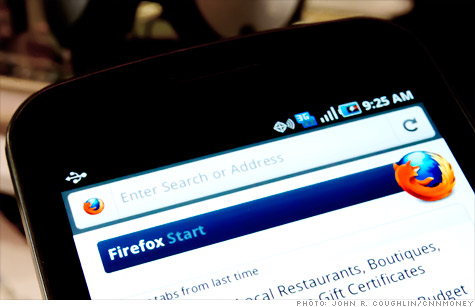
BARCELONA, Spain (CNNMoney) -- In a smartphone world dominated by Google and Apple, Firefox browser maker Mozilla thinks it can offer something better.
The organization announced Monday at Mobile World Congress in Barcelona that it has created a new smartphone platform called "Boot to Gecko." Major European carrier Telefonica said it wants to sell the devices.
Yes, Mozilla knows that challengers to Android and iOS haven't been a successful bunch. HP's (HPQ, Fortune 500) Palm essentially closed up shop. Research In Motion's (RIMM) BlackBerry and Nokia (NOK) have rapidly lost their once-dominant market share. Microsoft's (MSFT, Fortune 500) Windows Phone has yet to gain any traction.
Meanwhile, Google (GOOG, Fortune 500) and Apple (AAPL, Fortune 500) have amassed a combined 77% share of the U.S. smartphone market, according to comScore (COMS).
But what's different about Mozilla's new platform is that it's really not a new platform at all. It's the Web -- plain and simple.
"Developers aren't willing to rewrite all their apps for yet another proprietary system," Brendan Eich, Mozilla's chief technology officer, said in an interview on Monday. "That's why there won't be another successful custom operating system after iOS and Android. So the next logical step is to make the Web an OS."
The idea makes some sense. Next to each phone's text messaging application, the Web is the single most-used app on smartphones, comScore said in its latest content usage report. HTML5, the computer language that the Web is built with, has a growing list of features that make something like Boot to Gecko a possibility, such as a way to tap into the phone's radio to make calls.
A Web-based OS comes with some attractive benefits.
Web apps are platform agnostic, meaning they can run on an iPhone, an Android, a BlackBerry, a Windows Phone, or, now, a Boot to Gecko device. There's no fear of losing all of your apps if you switch phones -- those apps can travel with you. And developers like Web apps, because they can write one version of the software and have it work on every device.
That's not true of the other platforms, which use various coding languages. By stripping all that extra software out of the device, Mozilla thinks it can make most apps run better on its platform than on others'.
"Everything in Boot to Gecko is optimized for the browser," said Todd Simpson, Mozilla's innovation chief. "We got rid of Java and that whole layer of other stuff that's clogging up smartphones today. Eliminating all that makes devices perform much better."
Now for the major drawbacks to the model. Web apps can't tap into the phone's processor, making some applications slow. Video can be captured and stored, but playback is quite choppy. Some popular apps like Angry Birds and Cut the Rope run with delays because they can't use the phone's processor to run calculations.
But Mozilla believes the trend towards the Web is inevitable.
Facebook Chief Technology Officer Bret Taylor on Monday that the social network is throwing its support behind a standardized mobile payment process to be used by Web apps. Last summer, ESPN and The Financial Times launched new HTML5 apps, and the FT even pulled its app from app stores.
With Web apps, they can sell their app and keep all the proceeds for themselves. App stores, on the other hand, can impose strict rules and take a percentage of all app sales.
Mozilla feels that's why Android isn't a truly "open" system. Google requires some device and software makers to meet standards that are growing increasingly strict.
"Boot to Gecko is the first truly open Web platform," said Simpson. ![]()